King Alaric’s Strange Dream, Sack Of Rome And Forever Hidden Grave
Ellen Lloyd - AncientPages.com - The year was 395, and Alaric had just become the King of the Visigoths. A few days later, he had a strange dream that made an impression on him. What did it mean? Was he destined to accomplish something extraordinary, or was it a bad omen?
Deep in his heart, he knew he had been born to become a great warrior. Looking back at historical records, it seems obvious Alaric’s childhood, disappointment in the Roman Empire, and his strange dream shaped his personality.
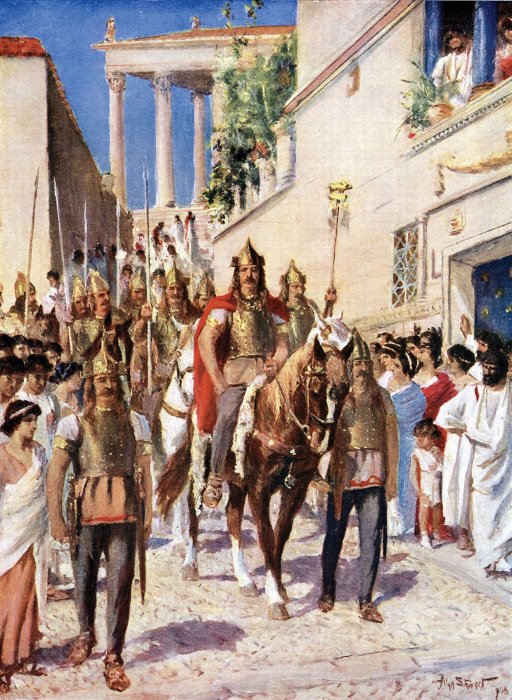
King Alaric enters Athens. Credit: Public Domain
Alaric is today famous for being the Visigoth leader who sacked Rome in 410, but this would probably never have happened if he had come to terms with the Roman government. What caused this frustrated man to attack Thrace, Macedonia, and Greece? Why did he invade Italy, and why will his grave never be found?
Who Was Alaric, The Leader Of The Visigoths?
There is still uncertainty as to when exactly Alaric was born. Nevertheless, most historians agree it was about 370 on Peuce Island at the Danube Delta's mouth in present-day Romania. It was a period when the Goths were constantly at war with another tribe of barbarians called Huns.
The term “Barbarians” is today much misused. In modern times, we often say Barbarians are uncivilized people or evil people, but the word had an entirely different meaning in ancient times. The term originated in ancient Greece, and it initially merely referred to people who did not speak Greek.
Romans’ expansion throughout Europe was often met with resistance by many tribes. Occasionally, some of the Barbarian tribes fought for the Roman Empire, and on other occasions, they battled against them. Both western Visigoth and eastern Ostrogoth branches of the Goths had a complicated relationship with the Romans.
Growing up in a hostile environment, always fearing for your life was most likely one reason why Alaric quickly decided to become a warrior. It is said that “even when a child he took delight in war, and at the age of sixteen, he fought as bravely as the older soldiers.” 1
The Agreement Between The Goths And The Roman Empire
The Goths were tired of fighting Huns. Sometimes the Goths managed to defeat the Huns and create a settlement, but soon after, the Huns returned and reclaimed the land. Finally, the Goths asked Emperor Flavius Valens (328 – 9 August 378) if they could be allowed to settle somewhere near Rome under the condition their warriors would fight for the Roman Empire if and when needed. Emperor Valens agreed and said: "Rome always needs good soldiers. Your people may cross the Danube and settle on our land. As long as you remain true to Rome, we will protect you against your enemies."
This agreement led to that many Visigoths moved and settled in what is today modern Bulgaria.
In time, the Visigoths became a powerful nation, and Alaric was chosen to become their leader in 395.
Alaric’s Strange Dream
Not long after this, he had a peculiar dream that did not leave him untouched.
In his dream, he saw himself “driving in a golden chariot through the streets of Rome amid the shouts of the people, who hailed him as emperor. This dream made a deep impression on his mind. He was always thinking of it, and at last he began to have the idea that he could make the dream come true.
"To be master of the Roman Empire," he said to himself, "that is indeed worth trying for; and why should I not try? With my brave soldiers I can conquer Rome, and I shall make the attempt." 1
Tensed Relationship Between The Goths And The Romans
But we mustn’t forget that Alaric was not hostile toward the Roman Empire from the beginning. Like many other Goths, Alaric had entered the Roman military service. In 394, he led a Gothic force that helped Emperor Theodosius defeat the Frankish usurper Arbogast. It was a fierce battle that Alaric barely survived, and he lost about 10,000 of his men. Later, he felt deeply disappointed because he received little recognition from the Emperor.

Imaginary portrait of Alaric. in C. Strahlheim, Das Welttheater, 4. Band, Frankfurt a.M., 1836. Credit: Public Domain
The Goths’ relationship with the Roman Empire was always tensed, and opinions were divided.
Many Goths “seemed less than happy with being drafted en masse to fight in Rome’s civil wars. They suspected that they were being deliberately sacrificed and that the Romans would dismantle the treaty of 382 if they got the chance. Some Goths rebelled or deserted rather than support Theodosius against Magnus Maximus and although this revolt was resolved through negotiations it was a precursor of what was to come later. Amongst the Goths two factions seem to have arisen.
On one hand, were those who felt their future prosperity depended on keeping the treaty terms and finding accommodation within Roman military and political structures. Such men would have been courted by the Romans and would have advanced in power and prestige through Roman patronage.
Many rose to high rank in the Roman army and later ended up fighting vigorously against their kinsmen. Others took a much dimmer view of Roman intentions and felt that they needed to look after themselves or risk having the fruits of victory being gradually whittled away.” 2
King Alaric made a decision that changed history. He told his Visigoth chiefs about his plans. He made it clear they must gather a great army and prepare for battle. The goal was to attack Rome. If they succeed, they will become rich and powerful. Everyone thought this was a good idea. Besides thinking about the riches and the Visigoths considered this to be a good opportunity to change history. They could finally end the Roman domination, or so they hoped.
King Alaric’s Attack
King Alaric and his army marched through Thrace and Macedonia and before long reached Athens. In Athens, there was no resistance because there were no warriors there. Alaric and his men plundered homes, temples before continuing into Elis's state, in the southwestern part of Greece. There, they encountered the famous general named Stilicho, who besieged them in their camp, but Alaric managed to escape.
 More determined than ever, he now launched an attack on Rome. He led his force of around 30,000 men on a march toward Rome to avenge their murdered families.
More determined than ever, he now launched an attack on Rome. He led his force of around 30,000 men on a march toward Rome to avenge their murdered families.
“As soon as Honorius, Emperor of the West, learned that Alaric was approaching, he fled to a strong fortress among the mountains of North Italy. His great general Stilicho came to his rescue and defeated Alaric near Verona. But even after this Honorius was so afraid of Alaric that he made him governor of a part of his empire called Western Illyricum and gave him a large yearly income. Honorius, however, did not keep certain of his promises to Alaric, who consequently, in the year 408, marched to Rome and besieged it.
The cowardly emperor fled to Ravenna, leaving his generals to make terms with Alaric. It was agreed that Alaric should withdraw from Rome upon the payment of 5,000 pounds of gold and 30,000 pounds of silver.
When Honorius read the treaty he refused to sign it. Alaric then demanded that the city be surrendered to him, and the people, terrified, opened their gates and even agreed that Alaric should appoint another emperor in place of Honorius.”
This new emperor, however, ruled so badly that Alaric thought it best to restore Honorius. Then Honorius, when just about to be treated so honorably, allowed a barbarian chief who was an ally of his to make an attack upon Alaric. The attack was unsuccessful, and Alaric immediately laid siege to Rome for the third time. The city was taken and Alaric's dream came true. In a grand procession he rode at the head of his army through the streets of the great capital. 1
Seeing all this happening, Alaric realized his dream had come true.
Alaric and his men destroyed and plundered Rome. They grabbed all they could carry and they took many slaves. But Alaric made clear there was one thing the Visigoths mustn’t destroy. He said to his army the Christina Churches cannot be damaged, and must remain untouched.
Alaric dressed in splendid clothes and sat at the throne. Romans kneeled before him and hailed him as a conqueror and emperor.
King Alaric’s Grave Will Never Be Found
After six days of pillage, King Alaric and his men left Rome. They were now on their way to Sicily, a region they intended to conquer and plunder as well. However, King Alaric suddenly felt he wasn’t well. He knew he was dying.
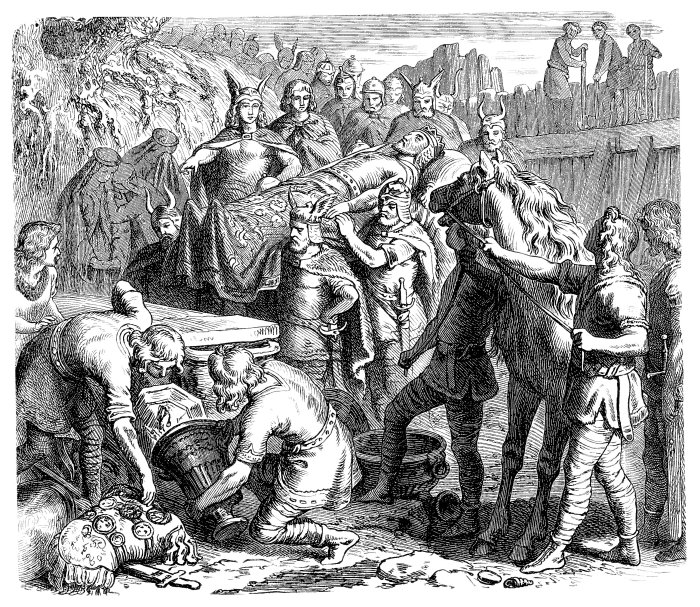
King Alaric didn't want his burial to be found. Credit: Erica Guilane-Nachez - Adobe Stock
He ordered his men to put in his grave the richest treasures that he had taken from Rome. “This order was carried out. A large number of Roman slaves were set to work to dig a channel and turn the water of the Busento into it. They made the grave in the bed of the river, put Alaric's body into and closed it up. Then the river was turned back to its old channel. As soon as the grave was covered up, and the water flowed over it, the slaves who had done the work were put to death by the Visigoth chiefs.” 1
The mighty Visigoth king Alric died in 410.
Those who hope King Alaric’s burial place is going to be found will be disappointed. He never intended his corpse to become part of history, only his accomplishments.
King Alaric hoped many times it would be possible to reach a suitable agreement with the Romans. Still, even when the Goths and Romans were on good terms, the former were always treated as second-class citizens. It's fair to say that ancient Romans changed the history of Europe, and King Alaric changed the history of the Roman Empire.
First version of this article was published on October 29, 2024
Written by Ellen Lloyd – AncientPages.com
Copyright © AncientPages.com All rights reserved. This material may not be published, broadcast, rewritten or redistributed in whole or part without the express written permission of AncientPages.com
Expand for referencesMore From Ancient Pages
-
 Archaeologists Have Discovered A Mummy Wrapped In Gold – Here’s What It Tells Us About Ancient Egyptian Beliefs
Featured Stories | Feb 7, 2023
Archaeologists Have Discovered A Mummy Wrapped In Gold – Here’s What It Tells Us About Ancient Egyptian Beliefs
Featured Stories | Feb 7, 2023 -
 Unsolved Ancient Mystery: Why Were These Foreign Shoes Hidden In A Temple?
Archaeology | Mar 29, 2014
Unsolved Ancient Mystery: Why Were These Foreign Shoes Hidden In A Temple?
Archaeology | Mar 29, 2014 -
 Hayk – Legendary Patriarch And Founder Of Armenia Who Defeated King Bel Of Babylon
Featured Stories | Feb 10, 2022
Hayk – Legendary Patriarch And Founder Of Armenia Who Defeated King Bel Of Babylon
Featured Stories | Feb 10, 2022 -
 Grave Of Amazon Warrior Who Lived In The Kingdom Of Urartu Discovered In Armenia
Archaeology | Nov 28, 2019
Grave Of Amazon Warrior Who Lived In The Kingdom Of Urartu Discovered In Armenia
Archaeology | Nov 28, 2019 -
 Amazing 4,500-Year-Old Egyptian Bead-Net Dress Found In Giza Tomb Restored
Featured Stories | Jun 27, 2023
Amazing 4,500-Year-Old Egyptian Bead-Net Dress Found In Giza Tomb Restored
Featured Stories | Jun 27, 2023 -
 Giant Azaes-Itzamna: Ninth King Of Atlantis, Founder Of Chichen Itza And Teacher Of Maya People
Civilizations | Jun 29, 2017
Giant Azaes-Itzamna: Ninth King Of Atlantis, Founder Of Chichen Itza And Teacher Of Maya People
Civilizations | Jun 29, 2017 -
 Sinuses Reveal More About The Evolution Of Ancient Humans
Archaeology | Oct 29, 2022
Sinuses Reveal More About The Evolution Of Ancient Humans
Archaeology | Oct 29, 2022 -
 407-Million-Year-Old Plant Fossil Challenges Long-Held Theory On Fibonacci Spirals Found In Nature
Evolution | Jun 22, 2023
407-Million-Year-Old Plant Fossil Challenges Long-Held Theory On Fibonacci Spirals Found In Nature
Evolution | Jun 22, 2023 -
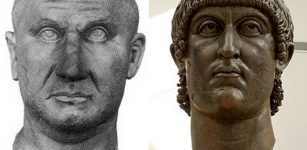 On This Day In History: Battle Of Cibalae Was Fought Between Two Roman Emperors – On Oct 8, 314
News | Oct 8, 2016
On This Day In History: Battle Of Cibalae Was Fought Between Two Roman Emperors – On Oct 8, 314
News | Oct 8, 2016 -
 Mystery Of The 3,500-Year-Old ‘Screaming Woman’ Mummy Solved
Archaeology | Aug 9, 2024
Mystery Of The 3,500-Year-Old ‘Screaming Woman’ Mummy Solved
Archaeology | Aug 9, 2024 -
 Hairy Snail Discovered In 99-Million-Year-Old Amber
Archaeology | Oct 29, 2022
Hairy Snail Discovered In 99-Million-Year-Old Amber
Archaeology | Oct 29, 2022 -
 A 35 Meter-Long Stone Platform Dated To 6,000 BC Discovered In Saudi Arabia
Archaeology | Jul 11, 2020
A 35 Meter-Long Stone Platform Dated To 6,000 BC Discovered In Saudi Arabia
Archaeology | Jul 11, 2020 -
 Lost Golden City Of Pharaoh Amenhotep III Discovered In Luxor
Archaeology | Apr 9, 2021
Lost Golden City Of Pharaoh Amenhotep III Discovered In Luxor
Archaeology | Apr 9, 2021 -
 Årsgång – Year Walk In The Forest – Mystical Journey To Gain Knowledge About The Future – An Ancient Swedish Ritual
Ancient Traditions And Customs | Jan 2, 2019
Årsgång – Year Walk In The Forest – Mystical Journey To Gain Knowledge About The Future – An Ancient Swedish Ritual
Ancient Traditions And Customs | Jan 2, 2019 -
 Sinister Mythical Dark Elves And Light Elves And Their Magical Ship ‘Skidbladnir’
Featured Stories | Oct 3, 2016
Sinister Mythical Dark Elves And Light Elves And Their Magical Ship ‘Skidbladnir’
Featured Stories | Oct 3, 2016 -
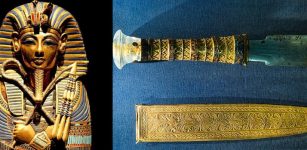 Tutankhamun Had An Ancient Dagger From Outer Space
Archaeology | Jun 1, 2016
Tutankhamun Had An Ancient Dagger From Outer Space
Archaeology | Jun 1, 2016 -
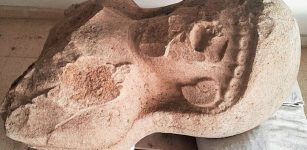 3,000-Year-Old Female Statue Unearthed In Turkey
Archaeology | Aug 11, 2017
3,000-Year-Old Female Statue Unearthed In Turkey
Archaeology | Aug 11, 2017 -
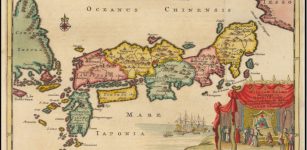 Spread Of Transeurasian Languages Was Due To Agriculture Study Reveals
Archaeology | Nov 10, 2021
Spread Of Transeurasian Languages Was Due To Agriculture Study Reveals
Archaeology | Nov 10, 2021 -
 Student Finds Beautiful Viking Age Silver Hoard In Aarhus, Denmark
Vikings | Aug 21, 2024
Student Finds Beautiful Viking Age Silver Hoard In Aarhus, Denmark
Vikings | Aug 21, 2024 -
 Mayan Underwater Tunnels With Bones Of Humans, Elephant-Like Creatures, Tigers, Bears, Tigers And Extinct Horses, Rediscovered In Yucatan
Archaeology | Jan 19, 2018
Mayan Underwater Tunnels With Bones Of Humans, Elephant-Like Creatures, Tigers, Bears, Tigers And Extinct Horses, Rediscovered In Yucatan
Archaeology | Jan 19, 2018
